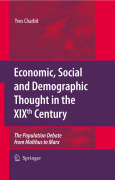
Economic, social and demographic thought in the XIXth century: the population debate from Malthus to Marx
Charbit, Y.
According to current understanding, Malthus was hostile to an excess of population because it caused social sufferings, while Marx was favourable to demographic growth in so far as a large proletariat was a factor aggravating the contradictions of capitalism. This is unfortunately an oversimplification. Both raised the same crucial question: when considered as an economic variable, how does population fit into the analysis of economic growth? Even though they started from the same analytical standpoint, Marx established a very different diagnosis from that of Malthus and built a social doctrine no less divergent. The book also discusses the theoretical and doctrinal contribution of the liberal economists, writing at the onset of the industrial revolution in France (1840-1870), and those of their contemporary, Pierre-Joseph Proudhon, who shared with Marx the denunciation of the capitalist system. Takes an innovative epistemological approach Offers an interdisciplinary analysis Provides in-depth historical contextualization INDICE: 1: The population controversy and beyond.- 2: Population, EconomicGrowth and Religion Malthus as a populationist.- 3: From Malthusianism to populationism The French liberal economists (1840-1870).- 4: The Malthusian Trap The failure of Proudhon.- 5: Capitalism and Population Marx and Engels againstMalthus.- 6: Beneath demographic issues.- Bibliography.- General Index.
- ISBN: 978-1-4020-9959-5
- Editorial: Springer
- Encuadernacion: Cartoné
- Páginas: 200
- Fecha Publicación: 01/05/2009
- Nº Volúmenes: 1
- Idioma: Inglés
